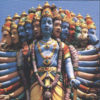What is the ‘god’ structure in Hinduism? That differs, but there are some principles across the board. One is the concept of a universal spirit called by many names, but not in a divisive way. More as a recognition of the manifold nature of this universal spirit. It is called by the Brahminists, Brahman, called by the Yagis, Shakti, and they seek to unify the kundalini force or primal fire with the Shakti or universal spirit. They see that the universal spirit is capable of taking on more focused forms, even physical incarnation. This is where the concept of avatars comes from. Loosely an avatar is akin to a Greek demi-god, but all the gods are seen as manifestations of the universal spirit, and often have either an elemental basis (like agni who is fire or indra who is rain), but also more abstract essences (like yama who is death).
There are two views of how one relates to the gods. They differ based on how you view the gods, but in general the gods are embraced if only as metaphor. If you see them as possessed of personality then you can communicate with them, and even the supreme principle is in some schools viewed as having a set of personalities. Through devotion to it you can realize your kinship to the divinity and ascend to loka (roughly heaven). Still basically the samadhi of other more atheistic schools of lasting instead of transitory bliss.
What did the Buddha find lacking in Hinduism? Many of the schools either emphasized a hierarchy that he saw as superfluous, or in fact abdicate responsibility for understanding the self or atman. On some levels the messainisitic trend did manifest in Hinduism, and it’s odd that the Buddha would come to be viewed by some as a messianic figure. The Buddha opposed that notion. Nor did he ever say he could or would save anyone’s atman or soul, but today some schools believe that possible.
Hinduism differs considerably from Christianity and is seen as one of the oldest organized religions on the planet, if not the oldest. It differs from Christianity, in the most part, as having never really lost its original shamanistic feature. They practice what is more properly called the sanatana dharma, more from an effort to live properly in the world than from a concept of moral virtue. It is more of an understanding of humanity and the world they live in, than it is a Salvationist path because the world is supposedly evil. Though there are faults found in the world. Much like some schools of Gnosticism seem to find fault in material existence, they just see it as not a full manifestation of divine potential.
Your thoughts are welcome. Be well friends.
Travis Saunders
Dragon Intuitive
~science,mysticism,spirituality~



Leave a Reply